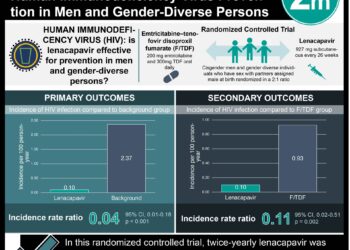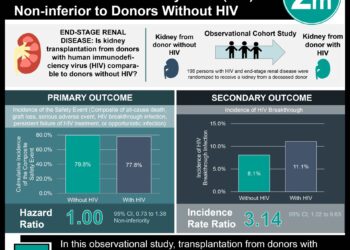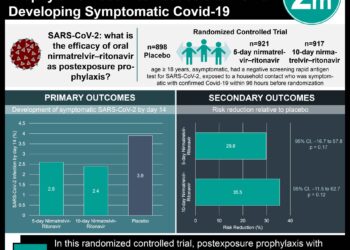Community treatment of HIV pre-exposure prophylaxis demonstrated low acquisition rate but disparities in adherence
1. For patients who received pre-exposure prophylaxis delivered through sexual health clinics in the United States, the adherence rate was 80.0% to 85.6%, and HIV incidence was low.
2. Improved adherence was associated with patients who had stable housing, reported more at-risk sexual activities, and those who had better initial engagement with the prophylaxis program. Lower adherence was associated with African-American race, and patients being seen in Miami, Florida.
Evidence Rating Level: 2 (Good)
Study Rundown: Pre-exposure prophylaxis (PrEP) for HIV infection with oral tenofovir/emtricitabine has been shown previously to reduce HIV acquisition amongst men who have sex with men (MSM) and transgendered women. However, there are concerns over the real-world effectiveness and safety in delivering PrEP at community-based clinics. The described study evaluates an open label program to deliver PrEP to participants at clinics that treat sexually transmitted infections (STIs), or that specifically serve MSM in three US cities. The project demonstrated retention of 78.5% of patients to the end of the 48 week evaluation period, with greater than 80% adherence. HIV acquisition incidence was low in this population. Adherence as measured by tenofovir blood levels was associated with stable housing, and those patients whom reported receptive anal sex without condom use with 2 or more partners within the prior 3 months. Lower adherence was associated with African-American race, and patients treated in Miami.
The study has numerous strengths, including its multi-city population and objective serum measurement of drug adherence. However, results for adherence and HIV acquisition may be biased by the relatively high rate of patients who were not retained to the end of the 48-week study period.
Click to read the study in JAMA Internal Medicine
Relevant Reading: Preexposure Chemoprophylaxis for HIV Prevention in Men Who Have Sex with Men
In-Depth [prospective cohort]: The study enrolled 557 patients without renal dysfunction or significant medical comorbidity from clinics in San Francisco, Miami, and Washington DC. Patients were followed from October 2012 to January 2014 in clinic at 4, 12, 24, and 48 weeks after start PrEP. Adherence and engagement was assessed by pill counts, questionnaire, clinic attendance, and blood levels of tenofovir as measured in 294 sample patients by Dried Blood Spot samples.
Overall, 78.5% of patients were retained to the 48-week clinic visit, and 68.8% of patients completed all 5 clinic visits. Two patients acquired HIV during the follow up period with incidence of 0.43 infections per 100 years. Both had tenofovir blood samples reflecting subtherapeutic dosing. Nineteen serious adverse events were reported, but none were attributed to the study drug. Thirteen individuals had creatinine elevations, and three participants discontinued PrEP due to creatinine levels. PrEP adherence was 86% at week 4 and 80% at week 48. Participants with more than 2 partners for receptive anal sex without condom use demonstrated increased adherence (88.6%, p = 0.003), as did patients with stable housing (86.8%, p = 0.001). African-Americans (56.8%, p < 0.001), and patients treated in Miami (65.1%, p < 0.001) demonstrated significantly lower adherence. Engagement at week 4 was correlated with engagement at week 48 (p < 0.001). STI incidence and sexual behaviors did not change over the study period.
Image: PD
©2015 2 Minute Medicine, Inc. All rights reserved. No works may be reproduced without expressed written consent from 2 Minute Medicine, Inc. Inquire about licensing here. No article should be construed as medical advice and is not intended as such by the authors or by 2 Minute Medicine, Inc.






![[CORAL-1 trial] Interferon-free regimen for recurrent hepatitis C after liver transplant safe and effective](https://www.2minutemedicine.com/wp-content/uploads/2014/11/10229_lores-75x75.jpg)
![Adverse pregnancy outcomes associated with thrombophilias [Classics Series]](https://www.2minutemedicine.com/wp-content/uploads/2015/07/Classics-2-Minute-Medicine-e1436017941513-75x75.png)